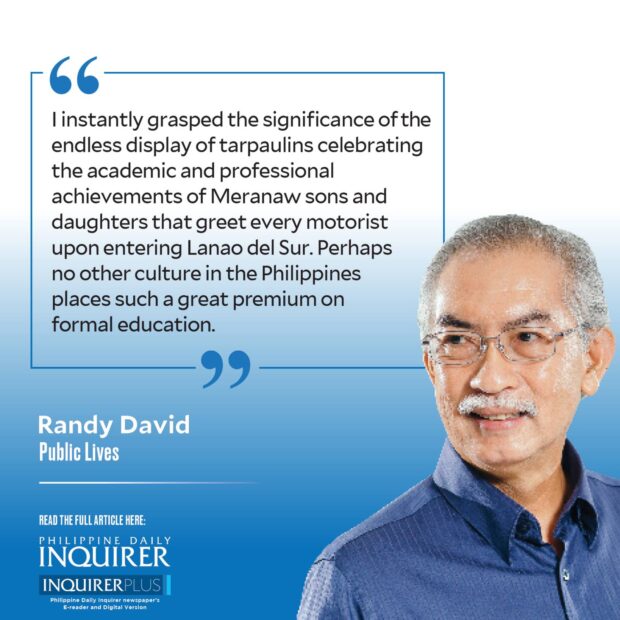Marawi’s unending crisis

In early May, as the sixth anniversary of the Marawi siege approached, I resolved to visit this historic Islamic city by the lake. I’ve been to the remotest parts of Mindanao but never to Marawi, the seat of Meranaw culture, and an important site of resistance in the colonial conquest of the country.
I almost canceled the visit. The day before my departure, more than 200 families in Marogong, Lanao del Sur, evacuated to neighboring towns, fearing an attack by the armed group Dawlah Islamiyah. Elements of Task Force Marawi, an interagency peacekeeping force, had earlier arrested four young members of the group.
My hosts, the Community and Family Services International (CFSI), which had carefully prepared my itinerary, assured me that the site of the incident was far from the areas I was to visit. But all the same, CFSI’s executive director Steve Muncy advised me not to hesitate to postpone the trip if I thought it was the wise thing to do. I chose to be guided by my hosts’ gut feel. From day one of the Marawi crisis, CFSI has been all over the place providing essential services to communities displaced by the war. Most of its staff are natives of Mindanao. They know what is happening on the ground. Even so, they thought it prudent for me to return to Iligan every day before it got dark, instead of staying in Marawi. I had earlier expressed a wish to do some early morning birdwatching on the shores of Lake Lanao, but that didn’t seem practicable on this visit.
Twice we circled what is referred to as Ground Zero in the heart of the city’s most affected area (MAA). (The literature on post-siege Marawi is littered with acronyms that reduce the complexity of the post-siege reality to something administratively manageable.) Surveying the worthless carcass of this once beautiful and historic city up close filled me with unfathomable sadness. The new civil infrastructure and public buildings seem almost complete, yet the place remains a ghost town.
Standing on the plaza of the newly restored Rizal Park, at more than 700 meters above sea level, I looked at the placid lake below and wondered what messages of wisdom it would communicate if it could speak. For there are questions that continue to trouble the Meranaw that are whispered about but are no longer part of the public discourse. What caused all of this? Could the destruction of this scale have been avoided? What has been the biggest stumbling block to the peaceful return of the people of Marawi to their homes and places of work?
I felt like a parachute journalist seeking explanations for events deeply rooted in layers of oppression and resentment, in memories of heroic struggle against pacification by outsiders, and in the sheer efforts of people to survive and weave a semblance of normalcy in the direst circumstances. I saw little in the developments at Ground Zero that, I thought, could serve as a basis for a hopeful closure of accumulated grievances.
Instead, I found enough reasons to hope in the unlikeliest places, in my interaction with people in the temporary shelters and in the communities that generously hosted the victims of displacement. There I encountered the outspoken Bai Faidah, a 69-year-old former schoolteacher, who has charted a clear path for herself and her children and grandchildren that did not depend solely on their return to their rented space in Marawi City.
To people like her who did not believe in putting their lives on hold while the government took its time sorting out eligibility requirements for aid and the requisite documentation of property rights, the key to moving on is to get a good education. Hearing this, I instantly grasped the significance of the endless display of tarpaulins celebrating the academic and professional achievements of Meranaw sons and daughters that greet every motorist upon entering Lanao del Sur. Perhaps no other culture in the Philippines places such a great premium on formal education. In the mountain village of Tapocan in Piagapo, I listened intently to the lamentations of a group of junior high school girls who had to stop schooling for financial reasons. One girl said she felt obliged to work in order to give her younger siblings a chance at education. Two newly appointed Alternative Learning System (ALS) teachers, who had come all the way from the town, assured them that if they couldn’t go to school, the school would come to them.
The youthful barangay chairman, Mansawi, beamed with pride. It was he who had requested ALS teachers for his village. I remembered asking if there were any boys among the out-of-school youth, and everyone nodded, but no one could say where they were.
Last Thursday morning, on the way to Laguindingan Airport for my return flight to Manila, I heard on the radio that there had been another clash the previous night in Marogong town. The casualties included four alleged members of the Dawlah Islamiyah-Maute group and one government soldier. The report said that two minors and a civilian woman had been rescued.




















